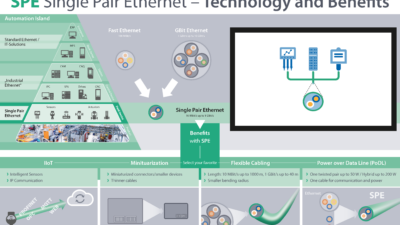In another dramatic twist, IEC SC65C subcommittee members voted 15-9 on Jan. 15 to recommend disqualifying six "no" votes that narrowly sank the proposed IEC 61158 fieldbus standard on Sept. 30, 1998.International Electrotechnical Commission (IEC) SC65C's working group conducted a two-month mail ballot of the subcommittee's participating members and tallied 15...
Geneva, Switzerland — In another dramatic twist, IEC SC65C subcommittee members voted 15-9 on Jan. 15 to recommend disqualifying six “no” votes that narrowly sank the proposed IEC 61158 fieldbus standard on Sept. 30, 1998.
International Electrotechnical Commission (IEC) SC65C’s working group conducted a two-month mail ballot of the subcommittee’s participating members and tallied 15 votes in favor, nine against, two abstentions, and one refused ballot. The approved recommendation calls for SC65C’s parent committee, TC65, to refuse six negative votes against Final Draft International Standard (FDIS) Application Layer (AL) and Data Link Layer (DLL) documents 197, 198, 199, and 200 that make up IEC 61158. It also asks TC65 to recount the original ballot without those “no” votes from Poland, Romania, Denmark, Luxembourg, Slovakia, and the Czech Republic.
Before casting their mail ballots, SC65C members were asked to review an analysis of technical reasons for the earlier votes against IEC 61158. IEC requires negative votes to have a valid technical basis; relate to the document being voted on; and have truthful technical comments. IEC 61158’s supporters claim the “no” votes didn’t have enough of this technical support.
TC65 is expected to refer the subcommittee’s recommendation to the IEC Committee of Action, which will require a two-thirds majority when it decides whether to include the six negative votes. If just four of the six “no” votes are overturned, SC65C’s Sept. 30 rejection of IEC 61158 would no longer have the 25% level required. This would theoretically give all four IEC 61158 documents enough votes for approval, potentially allowing it to become an international standard.
Profibus protests
Besides their mailed-in ballots, SC65C participating members also filed 11 “appeals, protests, and objections” with their votes. Profibus International (Titchfield, U.K.) says this signifies growing international discomfort over recent efforts to manipulate IEC 61158’s earlier rejection.
“The questionnaire asked participating members to agree with the view of one person that six ‘no’ votes were not accompanied by proper technical objections. These 11 appeals, protests, and objections indicate the FDIS votes were valid, and that it isn’t acceptable to disqualify them,” states Profibus. “It also confirmed views that IEC’s current ‘single’ [standard] strategy doesn’t meet market needs.”
Geoff Hodgkinson, Profibus’ public relations director, adds the Jan. 15 vote reflects in-built political bias. “Even if you accept the questionnaire as valid, it produced a weak result that confirms waning enthusiasm. One country did not participate at all. Two ‘yes’ countries provided evidence of growing doubts. Sweden abstained and stated, ‘It’s not for one national committee to judge another national committee.’ “
Mr. Hodgkinson adds, “Isn’t it time to call a halt? Attempting to manipulate the democratic FDIS result reduces the credibility of IEC 61158 even further. End-users came to terms with multiple fieldbuses long ago and the Netherlands’ proposal for a family of fieldbuses covering different transport functions, as defined in EN 50170, agrees with the IEC’s advisory board and sector board recommendations.”
FF celebrates
On the other side, John Pittman, president of the Fieldbus Foundation (Austin, Tex.), says, “This is a clear victory for the world’s end-users, control equipment suppliers, and IEC, who all desire one international fieldbus standard. I commend the members of SC65C for helping decide this important standardization issue in a fair and impartial manner. This latest ballot again demonstrates that a majority of IEC voting nations strongly support the final approval of the AL and DLL FDIS documents.”
Mr. Pittman continues, “This decision shows IEC members were not swayed by false claims of technical deficiencies within IEC 61158. The communications experts, who comprise IEC’s fieldbus subcommittee, have spent more than a decade developing an international standard embracing the best characteristics of the leading fieldbus solutions. These experts have disregarded the commercially-driven, protectionist arguments against the standard and made the correct decision.
“The Fieldbus Foundation and its members worldwide hope IEC’s leadership will now take decisive action to ensure that IEC 61158 FDIS documents receive final approval,” says Mr. Pittman.
History of IEC 61158
Though its history stretches back a decade and longer, recent milestones in the International Electrotechnical Commission’s (IEC, Geneva, Switzerland) effort to draft and adopt one international fieldbus standard include:
October 31, 1997: Third international ballot on the Data Link Layer (DLL) of IEC 61158 is rejected after crucial supporting vote from Brazil National Committee for Fieldbus reportedly isn’t received by IEC’s Geneva office until after the voting deadline.
February, 1998: IEC Committee of Action votes to count disputed Brazilian vote in favor of DLL for IEC 61158, which moves the proposed fieldbus standard to the Final Draft International Standard (FDIS) stage.
May 12, 1998: Profibus International claims most of IEC 61158 is obsolete and should replaced by an effort to standardize interfaces. Profibus adds it supports IEC 61158-2, which includes the Physical Layer for the process industries.
Sept. 30, 1998: IEC SC65C subcommittee narrowly votes to reject FDIS for the application layer and data-link layer of IEC 61158.
Oct. 20, 1998: SC65C members asked to analyze six “no” votes for technical validity.
Jan. 15, 1999: SC65C passes ballot recommending that its parent committee, TC65, invalidate six negative votes.


